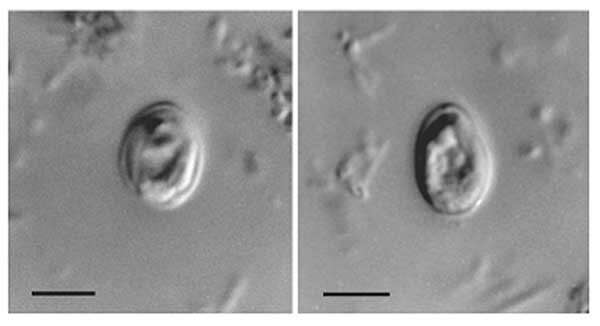This article has been reviewed according to Science X's editorial process and policies. Editors have highlighted the following attributes while ensuring the content's credibility:
fact-checked
peer-reviewed publication
trusted source
proofread
Dietary supplement could protect against Cryptosporidium infection

Researchers at the Francis Crick Institute have discovered that a common dietary supplement could protect against chronic Cryptosporidium infections which are particularly prevalent in children under two and in areas with poorer sanitation.
Cryptosporidium is a parasite that infects and damages the small intestine. It is one of the leading causes of diarrhea-related deaths in children, and is associated with malnutrition and growth stunting. Cryptosporidium is also a common infection in people with a weakened immune system.
A previous study where human volunteers were exposed to Cryptosporidium showed that people with higher levels of indoles in their feces prior to exposure were resistant to infection. Indoles are molecules normally found in cruciferous vegetables like broccoli, and they are known to activate the AHR system, a receptor which regulates barriers in the gut, skin, and lung.
Two labs at the Crick teamed up to investigate if, and how, the AHR system protects against Cryptosporidium infection.
In their study published in Cell Host & Microbe, the researchers exposed mice to the Cryptosporidium parasite and observed that infection triggered an expansion of immune cells in the intestinal epithelium (the layer of cells that line the intestine), which are part of the first line of defense against the parasite.
When these CD8+ T cells were transferred to mice with weakened immune systems, the researchers saw that the mice were now able to fight off Cryptosporidium infection.
Mice that lack the AHR receptor, or healthy mice fed a diet specifically deficient in indoles, had a reduced population of intestinal CD8+ T cells. This meant the mice were less able to fight off the infection, and showed that CD8+ T cells are reliant on the AHR system to protect the intestine.
Finally, nursing mouse mothers were given indoles, which were then transferred to babies through milk. When exposed to Cryptosporidium, the young mice never became ill, showing that the AHR system may be able to protect against infections in newborns.
This is important for humans, as the majority of life-threatening Cryptosporidium infections occur within a child's first year of life. Murali Maradana, joint first author with Bishara Marzook, is now working in India to investigate the impact of giving nursing mothers indole supplements to transfer protection to their children.
Adam Sateriale, Group Leader of the Cryptosporidiosis Laboratory at the Crick, said, "Cryptosporidium causes severe illness which can be fatal, and children who are malnourished often experience recurring infections. Indole supplements could easily be added to therapeutic food formulas given to people where Cryptosporidium is prevalent, and we are very excited that Murali will be continuing to explore the potential of this intervention in his new role."
Gitta Stockinger, Group Leader of the AHR Immunity Laboratory at the Crick, said, "By combining the expertise of our two labs, we were able to show that AHR is crucial in activating an immune response against Cryptosporidium, which could also be the case in other types of intestinal pathogens.
"Our study proves that dietary molecules which activate AHR, like indole-3-carbinol, could be used to stop a vicious cycle of chronic Cryptosporidium infections, and may protect young children from becoming ill in the first place if given to nursing mothers."
More information: Maradana, M and Marzook, B. et al, Dietary environmental factors shape the immune defence against Cryptosporidium infection, Cell Host & Microbe (2023). DOI: 10.1016/j.chom.2023.11.008. www.cell.com/cell-host-microbe … 1931-3128(23)00458-4

















